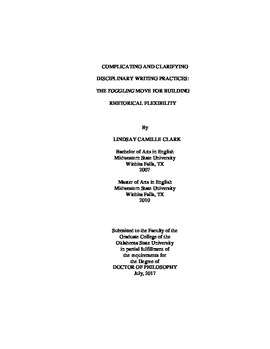| dc.description.abstract | Instructors across many disciplines integrate genre-based approaches into their instruction with the goal of preparing students to write effectively in academic and workplace settings. Though the instructional strategies may vary, writing instructors aim to develop students' rhetorical flexibility or the ability to utilize "semiotic resources across genres, professional practices, and disciplinary cultures" (Bhatia, 2008, p. 162). While the majority of genre research focuses on student genre analyses, this dissertation project contributes to genre studies by exploring how genre analysis activities foster students' development of genre knowledge and rhetorical awareness. In the first of three research phases, I explore how students analyze and produce academic and professional genres by examining student work, survey and interview responses, and teacher journal reflections. The students' demonstration of rhetorical decision-making prompted me to examine the way I integrated genre-based pedagogy into the classroom. In the second and third phases, I discuss the recurring pedagogical strategies that emerged from grounded analyses of two sets of classroom data. I discovered one recurring strategy, Toggling, that engages students in critical thinking by facilitating discussions that challenge the idea of templates, rules, and correctness and reveal the rhetorical complexities of disciplinary writing. By analyzing seven classroom transcripts during genre analysis activities, I discovered that Toggling emerged in three specific ways to illuminate disciplinary differences, connect students' antecedent knowledge to genre analysis and application strategies, and evaluate the rhetorical work of language. These Toggling moves offer practical pedagogical strategies for facilitating genre-learning: (1) share and invite writing experiences to facilitate active classroom engagement and prompt students to recall concepts and processes that demystify the writing process, (2) explore disciplinary variation to emphasize the rhetorical complexities of writing practices, and (3) focus on the rhetorical impact of language to support students' exploration of the relationship between text and context. The findings suggest that students' rhetorical flexibility is supported through genre, disciplinary, and rhetorical knowledge illuminated by Toggling strategies. Additionally, this study has implications for genre-based pedagogical research on building students' ability to exercise rhetorical flexibility when producing genres. | |
